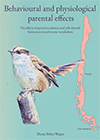PhD defence Martje Birker-Wegter
Martje L.M. Birker-Wegter (EGDB/BPE)
Promotores: Prof. A.G.G. Groothuis, Prof. J. Komdeur, Prof. R.A. Vásquez Salfate (University of Chile)

Behavioural and physiological parental effects
The effects of partial incubation and yolk thyroid hormones on embryonic metabolism
In ecology and evolution, parental effects refer to the influence parents have on their offspring's traits beyond just genetics. These effects come from factors like parental behavior, physiology, and the environment, shaping how offspring develop. Unlike genetic traits, which evolve slowly, these non-genetic influences can quickly help offspring adapt to changing environments, making them crucial for species survival. My research explores how maternal thyroid hormones (THs) and incubation behaviors affect embryo development in the Thorn-tailed Rayadito, a bird in Chile. This species lives in various climates, offering a unique way to study differences within the same species. I tested the idea that mothers in colder regions would deposit more THs in their eggs and use partial incubation to boost embryonic metabolism. As expected, I found that embryos in colder regions had higher heart rates, supporting the idea that their metabolism adapts to cold. However surprisingly, TH levels were lower, suggesting THs aren’t the main driver of these differences. My experiments showed that the embryos in colder areas could maintain metabolic activity even when egg temperatures dropped, indicating a unique form of cold tolerance. This research shows that environmental conditions and parental behaviors interact in complex ways to influence offspring development. Although my study was limited to two locations, it provides valuable insights into how species might adapt to climate change. Future research should explore more locations and factors to better understand these dynamics.
